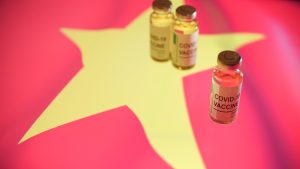Vietnam is set to purchase 10 million doses of Cuba’s coronavirus vaccine, as it pushes forward with its campaign to inoculate its 96 million people amid the stubborn persistence of the Delta strain of COVID-19. The deal was signed between the two governments yesterday during an official visit to Cuba by Vietnamese President Nguyen Xuan Phuc, where he met with his Cuban counterpart Miguel Díaz-Canel.
According to Cuban media, the agreement involves an initial 5 million doses of the locally made Abdala vaccine, but Vietnamese state media has reported that Prime Minister Pham Minh Chinh has authorized the purchase of a total of 10 million doses.
The agreement came just two days after Vietnam became the first foreign country to approve the emergency use of the Abdala vaccine, alongside seven other vaccines – AstraZeneca, Pfizer, Moderna, and Johnson & Johnson, the Chinese-made Sinopharm and Sinovac, and the Russian Sputnik V vaccine – whose diverse provenance mirrors Vietnam’s omnidirectional foreign policy. In particular, the approach to Cuba reflects the longstanding relationship of communist bloc solidarity that date back to the Vietnamese Communist Party’s struggle against the United States in the early 1960s.
Last week, Cuba started the process of seeking World Health Organization approval for Abdala and another locally developed vaccine, Soberana 02, both of which are in use on the island. It claims that Abdala showed itself to be 92.28 percent effective against COVID-19 during clinical trials in June. Cuba will also reportedly send a team to Vietnam to transfer its vaccine production technology.
While Vietnam earned global praise for its successful containment of the coronavirus in 2020, the country been hit hard by outbreaks of the contagious Delta variant that began in late April. At the time, just 35 people had died of COVID-19. That number has now exploded to more than 17,000, and for most of the past month, the country has registered daily caseloads in excess of 10,000.
The epicenter of the outbreak was in the southern metropolis of Ho Chi Minh City, Vietnam’s largest city, where outbreaks last month overwhelmed hospitals and led to food shortages. When ordinary lockdowns failed to curb the spread of the virus, authorities last month implemented a strict stay-at-home order in Ho Chi Minh City and deployed the army to assist quarantined residents.
Initially planned to end on September 15, the severe lockdown has since been extended to the end of the month. According to the indispensable Vietnam Weekly newsletter, Ho Chi Minh City is still averaging over 5,000 cases per day after more than 100 days of lockdown. Elsewhere, the spread of COVID-19 may be easing, with the capital Hanoi set to reduce its restrictions, after being relatively untouched by the outbreaks that have ravaged Ho Chi Minh City.
In recent months, the outbreaks have been compounded by the surprising sluggishness of Vietnam’s vaccine distribution campaign, which has been compounded by difficulties in obtaining sufficient vaccines for the country’s population.
Under the pressure of the current outbreaks, the vaccine rollout is finally beginning to make progress, although as of September 18 just 28 percent of the population had received their first dose of vaccine, the lowest figure in Southeast Asia outside crisis-hit Myanmar. Just 6.6 percent have been fully vaccinated. Much of these are in large cities; in Hanoi, for instance, 94 percent of the adult population of 5.75 million has received one shot of vaccine.
Assuming they are effective, the influx of Cuban vaccines will be an indispensable part of Vietnam’s pursuit of the widespread vaccine coverage that is necessary if the country is to end its months-long lockdowns.

































